Closed Pyometra In A
Miniature Schnauzer
Dr Sing Kong Yuen, BVMS (Glasgow), MRCVS
Article written on: 15 March 2009. Updated:
30 August, 2012
|
 toapayohvets.com toapayohvets.com
Be Kind To Pets
Veterinary Education
Project 2010-0129 |
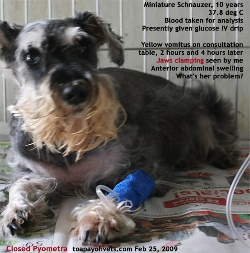 |
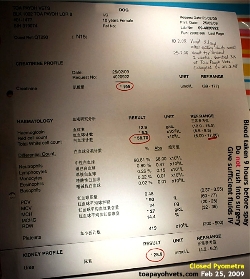 |
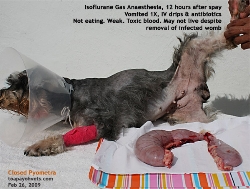 |
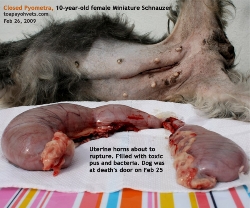 |
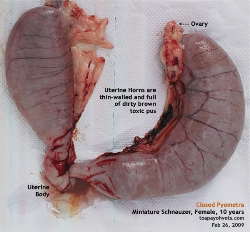 |
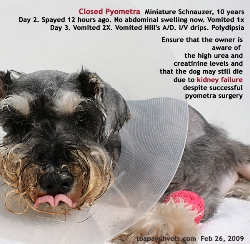 |
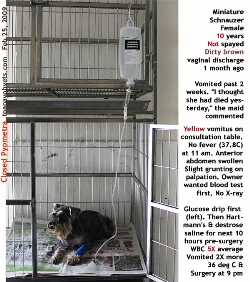 |
Closed
Pyometra
All owners do not want a dog to die on the operating
table. This dog was at death's door. Surgery could
not be delayed.
When to operate and how much IV fluids must be given
to maximise the dog's chances of survival during
surgery will depend on the veterinarian's judgment
and experience.
A dead dog on the operating table is never forgiven
by the owner and bad mouthing of the veterinary
competence might be the consequence.
|
The risks and
options are explained clearly to the owner and
recorded. An informed consent form must be
signed in case of litigation as Singapore is
becoming a litigious society as the country develops
into a "first world".
During litigation, the medical notes will be
referred to and if there are no records of informing
the owner of the risks and alternative treatments,
the medical negligence suit will not be in the
doctor's favour.
 UPDATE
ON AUGUST 30, 2012: UPDATE
ON AUGUST 30, 2012:
In 2012, I have implemented a work process in
which all vets performing operations at Toa
Payoh Vets have to be responsible for
recording in their own book of anaesthesia and
surgical templates the details of their
anaesthetic dosages and times taken as well as
surgical procedures. This book of records will
be their defence in cases of litigation and
investigations. |
|
TIPS FOR VETS
Each vet has his or her own judgment as to the use
of IV drips during surgeries.
I notice one vet inserting an IV catheter without
attachment to any IV drip set during surgeries.
I will advise all vets to connect an IV drip to the
IV catheter when performing spays and surgeries
rather than just inserting an IV catheter into the
cephalic vein by itself.
This is because, during emergencies, the IV catheter
will be clogged by the blood clot while an IV drip
will give instant IV access to emergency drugs
during the surgery. In some cases, I give
antibiotics and pain-killers prior to the start of
surgery as the dog is not well and needs prompt
surgery. In some pyometra cases, I run the IV drip
overnight first to re-hydrate the dog and give her
the antibiotics and pain-killers. This gives her a
better chance of survival rather than rushing into
surgery immediately.
In the above case, about 100 ml of glucose is given
IV, not the whole bottle! Know your IV infusion
well. |
|
|
Advertisement |
|
|
|
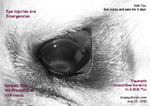 More
info at:
Dogs or
Cats More
info at:
Dogs or
Cats
To make an appointment:
e-mail
judy@toapayohvets.com
tel: +65 9668-6469, 6254-3326 |
 toapayohvets.com toapayohvets.com
Be Kind To Pets
Veterinary Education
Project 2010-0129 |
|
|
 TOA
PAYOH VETS
TOA
PAYOH VETS TOA
PAYOH VETS
TOA
PAYOH VETS